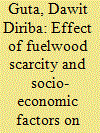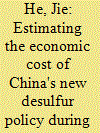| Srl | Item |
| 1 |
ID:
136232


|
|
|
|
|
| Summary/Abstract |
In Ethiopia biomass is predominantly utilized for household energy needs often using inefficient rudimentary stoves which cause adverse environmental and welfare effects. This paper examined the contribution of biomass resources to rural household energy use and energy substitution. The analysis applied the ordinary least square in the final stage estimation of fuelwood and overall biomass energy consumption by using predicted shadow prices. The paper used Tobit model to estimate charcoal and agricultural fuel consumption due to the presence of censoring. An increase in fuelwood shadow price was associated with reduced household fuelwood consumption with price elasticity of −0.38. The cross price elasticity between fuelwood and agricultural fuels revealed no evidence of energy substitution, which conforms to the findings of previous studies. Household access to electricity was associated with lower household biomass energy utilization but kerosene was not fuelwood substitute. Household energy use conformed to the ‘fuel stacking’ or ‘multiple fuel use’ concept, but households preferred modern energy options as welfare increased in areas where modern energy is available. This suggests that there is a promising prospect for fuel-transition, but access to modern energy and economic growth have key roles. The findings suggest that a concerted policy effort is required that would help diversify rural livelihoods, improve living standards and encourage economic growth, encourage inter-fuel substitution through improved modern energy access and afforestation to increase biomass supply.
|
|
|
|
|
|
|
|
|
|
|
|
|
|
|
|
| 2 |
ID:
168302


|
|
|
|
|
| Summary/Abstract |
We analyze domestic household energy demand and use patterns in Tanzania, using a detailed household survey of purchase transactions, a multivariate probit model, and the QUAIDS modeling framework. The main fuel sources that we study are kerosene, charcoal, and firewood. These three accounted for 96.5% of spending on energy by households. Charcoal and firewood are used for cooking while kerosene is used for lighting and cooking. Kerosene is almost exclusively imported, while charcoal and firewood are produced domestically. These fuel sources are important, given the impacts of wood harvesting on the environment and kerosene imports on public finances. We find a statistically significant response in kerosene demand to charcoal prices, suggesting a pattern of substitution, but no strong substitution relationships between other fuel pairs. These results, which we use in a simulation of tariff change, imply that policies centered on price changes may not be effective in changing consumer behavior unless alternative sources of energy are readily accessible.
|
|
|
|
|
|
|
|
|
|
|
|
|
|
|
|
| 3 |
ID:
067281


|
|
|